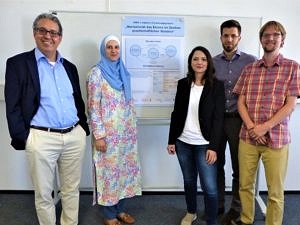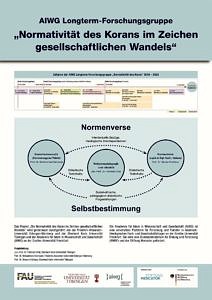AIWG Longterm Project: Quranic Normativity and Social Change


Head of Project:
-
Prof. Dr. Mohammed Nekroumi, Friedrich-Alexander-Universität Erlangen-Nürnberg
-
Prof. Dr. Mouez Khalfaoui, Eberhard Karls Universität Tübingen
-
Jun.-Prof. Dr. Fahimah Ulfat, Eberhard Karls Universität Tübingen
Team:
Duration:
- 2018 – 2022
Research Goals:
The basis of this project is a comprehensive hermeneutic and socioethical examination of Quranic scripture, which we approach through Islamic exegetical and legal traditions. While discourse of the legal status and fixity of scriptural norms (ayāt al-aḥkām) is, indeed, nearly as old as the Quran itself, this subject has in more recent contexts been featured at the center of debates over ethics and secularization. Accordingly, a traditional understanding of a fixed Islamic legal system is no longer a relevant part of life for Muslims outside of predominantly Islamic societies. This research project aims at providing a dynamic academic account of these debates over scriptural norms, with a particular focus on the practical relevance of these questions for Muslim people living in Germany.
Main Objectives
The long-term research project “Quranic Norms and Social Change” is primarily concerned with the research of scriptural norms (ayat al-aḥkām). Our understanding of scriptural norms emphasizes the ethical substance of the Quran and practical concerns of Muslim people, while also questioning conventional dichotomies like good and evil, right and wrong, and permitted and forbidden. This project thus assumes an interdisciplinary structure, including perspectives of experts in the fields of Quranic studies, Islamic law, and Islamic religious education. Furthermore, the ethical principal of self-empowerment is a basis for our investigation of scriptural norms, therefore embodying the desires of many Muslim people to lead more autonomous and individual lives. This project promotes the personal religious beliefs of individual Muslims and the possibility of building communities that deal with existing challenges through collaborative and solution-oriented methods.
Accordingly, this project’s investigation of scriptural norms adopts three primary topics:
- The depictions of humanity in scriptural norms, and their interpretations (for example, questions relating to the relationship between God and humanity)
- The individual and society, and social relations (for example, questions relating to gender equality, relationships between men and women, and strategies for conflict resolution)
- Interreligious coexistence (for example, Muslim people’s moral conceptions of others’ ways of life; or concepts of interreligious marriage, dietary rules, and related challenges in multireligious environments)